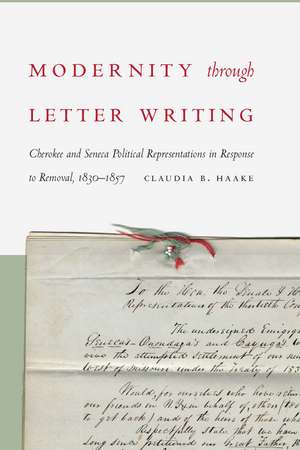Modernity through Letter Writing: Cherokee and Seneca Political Representations in Response to Removal, 1830–1857
Autor Claudia B. Haakeen Limba Engleză Hardback – 31 aug 2020
The amount of time and energy they expended on the missives demonstrates that authors from both tribes considered letters, memoranda, and petitions to be a crucial political strategy. Instead of merely observing Western written conventions, the Cherokees and Senecas incorporated oral writing and consciously insisted on elements of their own culture they wanted to preserve, seeking to convey to the government a vision of their continued political separateness as well as of their own modernity.
Preț: 509.68 lei
Nou
Puncte Express: 765
Preț estimativ în valută:
97.56€ • 106.01$ • 82.00£
97.56€ • 106.01$ • 82.00£
Carte tipărită la comandă
Livrare economică 21 aprilie-05 mai
Preluare comenzi: 021 569.72.76
Specificații
ISBN-13: 9781496215673
ISBN-10: 1496215672
Pagini: 282
Ilustrații: 8 illustrations, 4 maps, index
Dimensiuni: 152 x 229 x 24 mm
Greutate: 0.59 kg
Editura: Nebraska
Colecția University of Nebraska Press
Locul publicării:United States
ISBN-10: 1496215672
Pagini: 282
Ilustrații: 8 illustrations, 4 maps, index
Dimensiuni: 152 x 229 x 24 mm
Greutate: 0.59 kg
Editura: Nebraska
Colecția University of Nebraska Press
Locul publicării:United States
Notă biografică
Claudia B. Haake is a senior lecturer in history at La Trobe University. She is the author of The State, Removal and Indigenous Peoples in the United States and Mexico, 1620–2000 and coeditor (with Richard Bessel) of Removing Peoples: Forced Migration in the Modern World.
Cuprins
List of Illustrations
Acknowledgments
Introduction
1. Civilization and the Removal Policy
2. Authorship and Writing Practices
3. Ideas of Law in a New Age of Letter-Writing Diplomacy
4. Indian Tradition and Diplomatic Custom
5. The Bonds between People, Land, and Culture
Conclusion
Notes
Bibliography
Index
Acknowledgments
Introduction
1. Civilization and the Removal Policy
2. Authorship and Writing Practices
3. Ideas of Law in a New Age of Letter-Writing Diplomacy
4. Indian Tradition and Diplomatic Custom
5. The Bonds between People, Land, and Culture
Conclusion
Notes
Bibliography
Index
Recenzii
“Claudia Haake’s fine-grained study details an emerging world of early nineteenth-century American Indian letter writing, in which Native peoples reshaped familiar rhetoric and animated new forms of diplomacy to preserve their independence and control over land and culture. Modernity through Letter Writing makes a major contribution to studies of indigenous literary production and political consciousness.”—Philip J. Deloria, coeditor of A Companion to American Indian History
“What is especially important about this volume is the way Haake presents in historical context the urgent transition that indigenous nations, such as the Cherokees and Senecas, went through to adapt the English language into their political and cultural sovereignty at a time of crisis.”—David Martínez, author of Life of the Indigenous Mind: Vine Deloria Jr. and the Birth of the Red Power Movement
“Extraordinary. . . . This is a sui generis study for all of us to rethink how American Indians shaped their histories.”—Donald L. Fixico, author of Call for Change: The Medicine Way of American Indian History, Ethos, and Reality
Descriere
Modernity through Letter Writing examines the discursive practices between Native and non-Native writers during the removal era. In this process of written diplomacy, protest, and petitioning, Native writers developed strategies for negotiating the policies of Indian Removal and advocating for their own indigenous nations.
